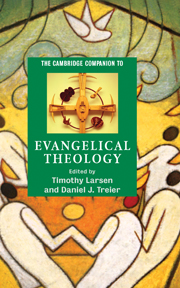Book contents
- Frontmatter
- 1 Defining and locating evangelicalism
- Part I: Evangelicals and Christian doctrine
- Part II: The contexts of evangelical theology
- 10 Evangelical theology and culture
- 11 Evangelical theology and gender
- 12 Race and the experience of death: theologically reappraising American evangelicalism
- 13 Evangelical theology and the religions
- 14 Evangelical theology in African contexts
- 15 Evangelical theology in Asian contexts
- 16 British (and European) evangelical theologies
- 17 Evangelical theology in Latin American contexts
- 18 Evangelical theology in North American contexts
- Index
13 - Evangelical theology and the religions
from Part II: - The contexts of evangelical theology
Published online by Cambridge University Press: 28 September 2007
- Frontmatter
- 1 Defining and locating evangelicalism
- Part I: Evangelicals and Christian doctrine
- Part II: The contexts of evangelical theology
- 10 Evangelical theology and culture
- 11 Evangelical theology and gender
- 12 Race and the experience of death: theologically reappraising American evangelicalism
- 13 Evangelical theology and the religions
- 14 Evangelical theology in African contexts
- 15 Evangelical theology in Asian contexts
- 16 British (and European) evangelical theologies
- 17 Evangelical theology in Latin American contexts
- 18 Evangelical theology in North American contexts
- Index
Summary
INTRODUCTION: EVANGELICALS ENTER THE THEOLOGY OF RELIGIONS
The question of the theology of religions - the relation of Christian faith to other living faiths - is an urgent issue for evangelicals for several reasons. First of all, evangelicalism, unlike any other contemporary Christian movement except for the Roman Catholic Church, finds itself embedded within all major religions and cultures of our shrinking globe. Second, evangelicals in general are the most mission-minded believers of all; their encounter with Muslims, Buddhists, Hindus, and followers of other religions is an everyday experience. Third, evangelicals' entrance into the mainstream theological academy during the past decades has exposed them to a fruitful dialogue with views different from their own.
With sweeping generalizations, one can say that there have been three main stages in the development of evangelical theologies of religions during the twentieth century. The first phase, lasting until the midcentury, continued the typical Protestant particularist attitude according to which not only is salvation found in Christ, but also a person has to make a personal response of faith in order to be saved. The second phase in my chronology started when a few influential evangelicals such as the British scholar of religions Sir Norman Anderson and another Englishman, the literary critic C. S. Lewis, started questioning the particularist viewpoint in the mid-twentieth century.
- Type
- Chapter
- Information
- The Cambridge Companion to Evangelical Theology , pp. 199 - 212Publisher: Cambridge University PressPrint publication year: 2007
- 1
- Cited by

